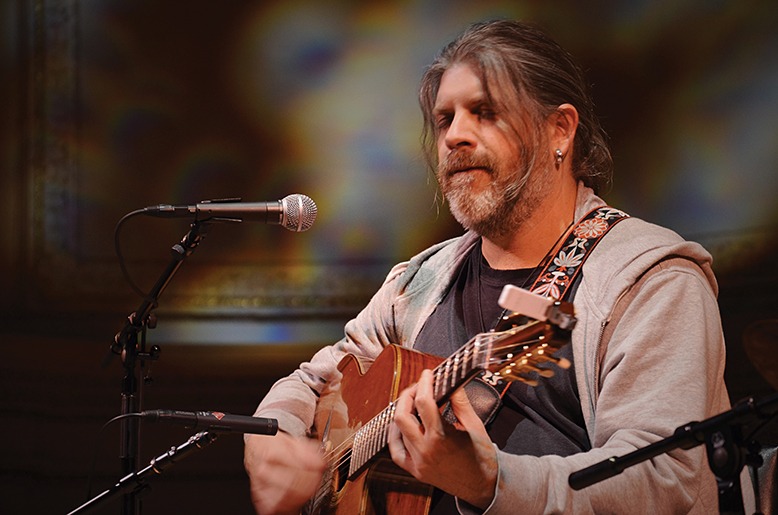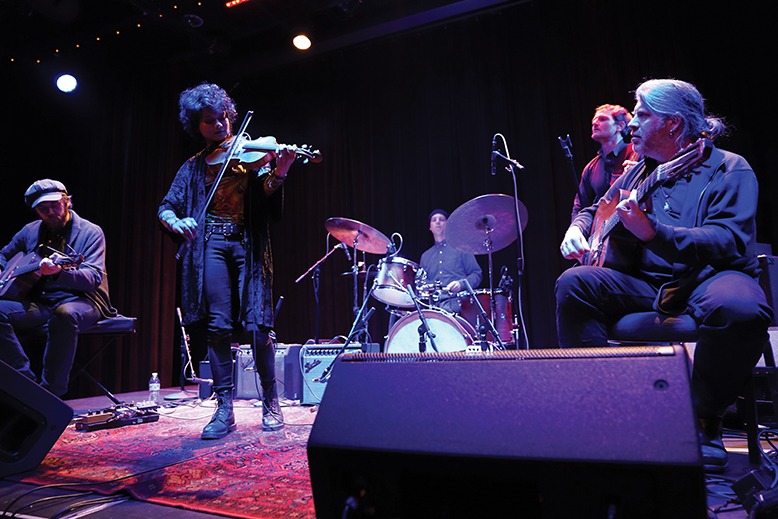
Through performances and recordings, Maplewood’s Stéphane Wrembel honors the legacy of legendary guitarist Django Reinhardt. Courtesy of Irene Ypenburg
It was 1993, and 19-year-old Stéphane Wrembel had been playing guitar for four years. He was mostly into rock—Pink Floyd was his passion—but his musical vistas were expanding. For the first time, he attended the annual Django Reinhardt festival in Samois-sur-Seine, a village adjoining his hometown of Fontainebleau in France.
“When I went to the Django festival and finally heard the Gypsies play,” he says in his thickly accented but fluent English, “I had a revelation. I knew I was going to focus on Django’s music as an essential piece of my learning. It became the center of everything for me.”
Flash-forward 28 years to the present, and Wrembel, now a resident of Maplewood, is a leading interpreter of what is often referred to as Gypsy jazz. It’s a genre that fuses swing with elements of music from the Sinti, a Roma tribe from Western Europe. It evolved in the mid-1930s from the collaboration of Reinhardt on guitar and Stéphane Grappelli on violin. The two recorded and performed together with their band, Quintette du Hot Club de France.
You may never have heard of Wrembel, but chances are you’ve heard his music. He wrote the song “Bistro Fada,” for Woody Allen’s Oscar nominated movie Midnight in Paris (2011). And he performed it in the 2012 Academy Awards show. The movie’s soundtrack also won a Grammy (2012) for Best Compilation Soundtrack for Visual Media.
Allen used a second Wrembel recording, “Big Brother,” in his film Vicky Cristina Barcelona (2008). Wrembel composed all the music for another Allen movie, Rifkin’s Festival (2020).
Wrembel’s guitar skills are prodigious. He can fire off lightning-fast melodies and solos or play sensitive, slow passages; all seem effortless. His playing is so authentic, it easily transports you to a Paris club in the 1930s.
“Stéphane is a great guitar player who is carrying on the tradition of Django Reinhardt into the modern age,” says renowned jazz guitarist and New Jersey native Dave Stryker.
Wrembel mostly plays a steel-string Nouveau model guitar from Bob Holo, an instrument similar to what Reinhardt played. It features a smaller-than-normal sound hole that’s oval rather than round, and an electric guitar-like tailpiece. “Not too rich. Not too bassy, not too trebly,” is how Wrembel describes the tone of this distinctive guitar type.
Wrembel has delved deeply into Reinhardt’s repertoire and transcribed many of his compositions and solos. He can sound like Django when he wants to, but his playing style also incorporates touches of flamenco, rock, classical, blues and other styles.
[RELATED: The Perfect Harmony of John Pizzarelli and Jessica Molaskey]
Before the pandemic, Wrembel was performing about 100 dates a year Stateside and internationally, many with his groups, the Django Experiment and the Stephane Wrembel Band. In January of this year, he released his 10th album, The Django Experiment VI.
Wrembel hosts the annual Django a Go-Go Festival, which brings together contemporary interpreters of Reinhardt’s music. Last year’s festival was staged remotely, but as of now, the 2021 festival is scheduled for June 3–6 at the Woodland in Maplewood, and Drom in New York.

Wrembel with his band, the Django Experiment. Courtesy of Casey Vock
The rich cultural heritage of Fontainebleau had a significant influence on Wrembel growing up. “It looks like Paris, but it’s very small, maybe 20,000 people,” he says. “Debussy composed there, Ravel, all those guys were there. It’s a very powerful place for the French culture.”
Reinhardt moved to Samois-sur-Seine for a few years before his death at age 43 in 1953. He quickly became part of the area’s cultural identity. “Django found this place, fell in love with it, and established his base there,” says Wrembel.
In 1993, after Wrembel’s revelatory moment at the festival, he was determined to learn how to play guitar in Reinhardt’s style. It was no easy task. “There was no YouTube in 1993. No method books. There was nothing,” he recalls.
Through a guitar magazine, he found a Russian mandolin player who knew some Gypsy jazz and showed him a few basics. After that, Wrembel met and studied in Paris with guitarist Serge Krief, whom he describes as “one of the great masters of the Django style.”
Around the same time, while Wrembel was attending the American School of Modern Music in Paris, a friend told him of a Sinti campsite in a town called Sanois, where music was played every day. “I would go to school in the morning in Paris,” he recalls. “Around noon, my friend would pick me up, and we would go to the camp and play until nighttime.”
In 2000, Wrembel left France to study at Berklee College of Music in Boston. “I always had a dream of coming to the U.S., and I was saving my first plane trip for that. It was almost like a sacred mission,” he says. “I never moved back. I love this country. I’m American now.”
After finishing at Berklee, Wrembel moved to New York City to start his music career. In 2003, he began dating a woman from Maplewood. “I spent my life between Maplewood and New York City,” he says. He made the permanent move to Maplewood in 2011 and got married a year later. He has two children in the town’s school system, and his wife is a teacher there.
“What I love about Maplewood is most of the time, people are very open to music and art,” says Wrembel. “There is a certain life in that village, and also a beauty about the houses and the gardens. The aesthetic of the town, in general, is very pleasant. I like the old Maplewoodians, people that have been there forever. Those people are cool.”
Wrembel has embraced New Jersey life. “I love to go to the beach,” he says. “I love Ocean Grove…very good things are happening there.”
***
Although the pandemic grounded his touring, Wrembel has played some live-streamed shows over the past year. His latest, recorded live on April 22, is available on demand at the website gigs.live; he performed the songs from his 2020 album, Django L’Impressioniste, which consists of his interpretation of 17 of Reinhardt’s solo pieces.
“It took me three years to transcribe, learn them by heart, explore every corner of them, and then record them and release an album,” he says.
Wrembel has taken advantage of Covid-19 isolation by learning to play classical guitar. He practices five hours a day, starting at 5 am. “I try to be very diligent,” he says. During the afternoons, he works on his Django repertoire and teaches private lessons.
“I read a lot of philosophy, I practice a lot of music, and that’s what is now,” he says. “And when it reopens, and it’s good, then we’re going to make plans.”
